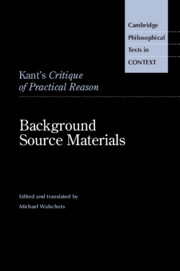Book contents
- Kant’s Critique of Practical Reason
- Kant’s Critique of Practical Reason
- Copyright page
- Dedication
- Contents
- Preface
- Acknowledgements
- General Note on Citations and Translations
- General Introduction
- Part I Pre-Kantian Moral Philosophy
- Part II Between the Critiques
- Part III The Reception of the Critique of Practical Reason
- Bibliography
- Index
- References
Bibliography
Published online by Cambridge University Press: 31 January 2025
- Kant’s Critique of Practical Reason
- Kant’s Critique of Practical Reason
- Copyright page
- Dedication
- Contents
- Preface
- Acknowledgements
- General Note on Citations and Translations
- General Introduction
- Part I Pre-Kantian Moral Philosophy
- Part II Between the Critiques
- Part III The Reception of the Critique of Practical Reason
- Bibliography
- Index
- References
- Type
- Chapter
- Information
- Kant's Critique of Practical ReasonBackground Source Materials, pp. 281 - 292Publisher: Cambridge University PressPrint publication year: 2024

